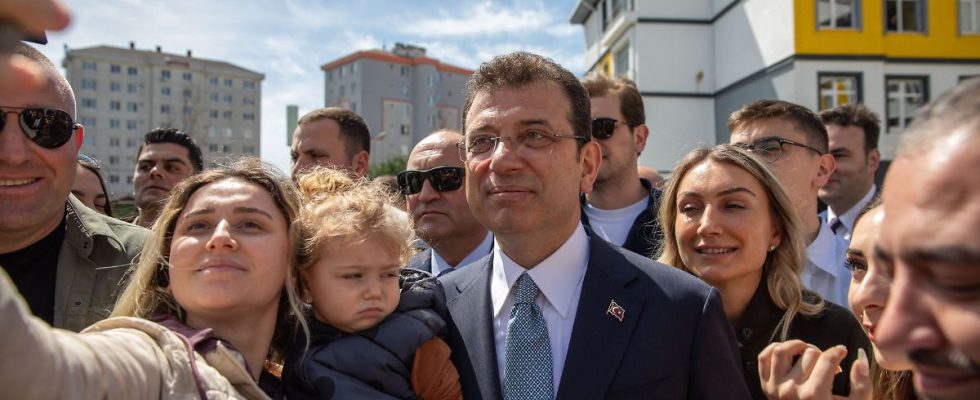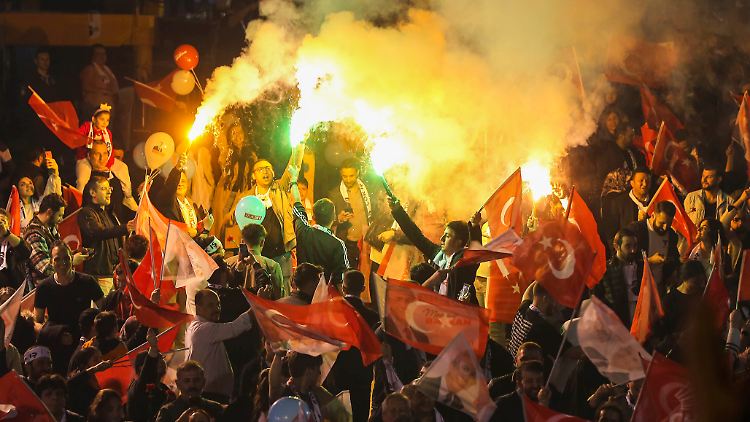Update
Trend: AKP loses in Istanbul
Erdogan probably missed his target in the Turkey election
March 31, 2024, 11:38 p.m
Listen to article
This audio version was artificially generated. More info | Send feedback
The Turkish president is particularly aware of the rural parts of his country behind him. But he also wants to score points in the big cities in the local elections. Without success. The largest opposition party announced election victories in Istanbul and Ankara.
In the local elections in Turkey, the social democratic opposition party CHP said it defended the mayoralty of Istanbul. Mayor Ekrem Imamoglu declared himself the winner of the election in Turkey’s largest city in terms of population and economic power. After counting the ballot papers from 96 percent of the ballot boxes, he was ahead by more than a million votes, the CHP politician explained. Imamoglu is considered a possible challenger to President Recep Tayyip Erdogan in the next presidential election. Erdogan had made regaining the mayoralty of Istanbul for his Islamic conservative AKP a main goal of the local elections. His party had sent former Environment Minister Murat Kurum into the race in Istanbul.
In Istanbul, after more than 71 percent of the votes were counted, incumbent Imamoglu was 50.4 percent ahead of his AKP rival, who had 40.9 percent. In Ankara, the incumbent mayor Mansur Yavas, also from the largest opposition party CHP, declared himself the winner of the election, even though the votes were still being counted. After 46.4 percent of the votes were counted, Yavas was with 58.6 percent of the votes, well ahead of his main rival from the ruling AKP party, who got 33.5 percent.
In addition to Izmir, CHP stronghold and third-largest city in the country, and Antalya in southern Turkey, there are also signs of a spectacular CHP victory in Anatolia. According to partial results, the opposition party is also ahead in some provincial capitals that were long dominated by the AKP. “The voters voted to change the face of Turkey,” said CHP leader Özgür Özel. “They want to open the door to a new political climate in our country,” he added.
In the local elections, there were signs that the ruling AKP party was losing a lot of votes across the country. After around a third of the votes were counted, the CHP was just ahead of the AKP (around 37 percent) with around 39 percent, as the state news agency Anadolu reported, citing unofficial preliminary figures. In the previous local elections in 2019, the AKP received 44 percent of the vote.
Erdogan experiences the worst setback in Istanbul
Around 61 million people in 81 provinces were called upon to elect mayors, municipal councilors and other local politicians. The vote is an important barometer of the mood and sets the course for the country’s political future. There were deadly clashes in the southeast in connection with the vote.
Erdogan’s main goal was to win back the metropolis of Istanbul with his AKP. The CHP politician Imamoglu wrested power in Istanbul from Erdogan’s ruling AKP in 2019, ending 25 years of government by Islamic conservative parties. The AKP had the election canceled at the time. In the second round, Imamoglu won by an even larger margin – the success is the worst setback in Erdogan’s political career to date. Erdogan’s political rise began in Istanbul when he was elected mayor in 1994.
Türkiye’s economy is limping
One person was killed and eleven others were injured in the southeastern Turkish metropolis of Diyarbakir after a dispute over the election of a community leader escalated, state news agency Anadolu reported. A dispute over the election also escalated in Siirt province and one person was killed.
The election took place under difficult circumstances: the high inflation rate and the economic situation may have cost Erdogan’s party votes. The opposition, in turn, which ran as an alliance in the parliamentary and presidential elections in 2023, appears divided and no longer ran as a unit.
Irregularity in the southeast
The election campaign was widely described as unfair – much of the media in Turkey is under direct or indirect government control. No major voting irregularities were initially reported. The DEM party said officials in the southeastern Turkish province of Sanliurfa tried to vote at more than one ballot box. This was prevented and documented.
A delegation from the Council of Europe and the Left Party observed the elections on site. Thousands of volunteers were also supposed to ensure an orderly process. Shortly before the vote, the Oy ve Ötesi association said it had been able to recruit 30,000 people. That is more than in the local elections in 2019, but significantly less than in the parliamentary and presidential elections in 2023, for which 200,000 people registered as election workers.


